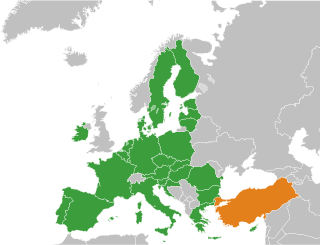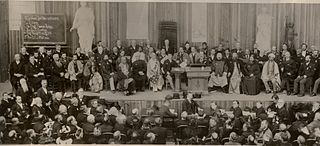
Brussels, officially the Brussels-Capital Region, is a region of Belgium comprising 19 municipalities, including the City of Brussels, which is the capital of Belgium. The Brussels-Capital Region is located in the central portion of the country and is a part of both the French Community of Belgium and the Flemish Community, but is separate from the Flemish Region and the Walloon Region. Brussels is the most densely populated and the richest region in Belgium in terms of GDP per capita. It covers 162 km2 (63 sq mi), a relatively small area compared to the two other regions, and has a population of over 1.2 million. The five times larger metropolitan area of Brussels comprises over 2.5 million people, which makes it the largest in Belgium. It is also part of a large conurbation extending towards Ghent, Antwerp, Leuven and Walloon Brabant, home to over 5 million people.

The European Parliament (EP) is one of three legislative branches of the European Union and one of its seven institutions. Together with the Council of the European Union, it adopts European legislation, commonly on the proposal of the European Commission. The Parliament is composed of 705 members (MEPs). It represents the second-largest democratic electorate in the world and the largest trans-national democratic electorate in the world.

The European Commission (EC) is the executive branch of the European Union (EU). It operates as a cabinet government, with 27 members of the Commission headed by a President. It includes an administrative body of about 32,000 European civil servants. The Commission is divided into departments known as Directorates-General (DGs) that can be likened to departments or ministries each headed by a Director-General who is responsible to a Commissioner.

Belgium is a federal state comprising three communities and three regions that are based on four language areas. For each of these subdivision types, the subdivisions together make up the entire country; in other words, the types overlap.

The Parliament of the Brussels-Capital Region, is the governing body of the Brussels-Capital Region, one of the three regions of Belgium. It is also known as the Brussels Regional Parliament.

In Belgium, the French Community refers to one of the three constituent constitutional linguistic communities. Since 2011, the French Community has used the name Wallonia-Brussels Federation, which is controversial because its name in the Belgian constitution has not changed and because it is seen as a political statement. The name "French Community" refers to Francophone Belgians, and not to French people residing in Belgium. As such, the French Community of Belgium is sometimes rendered in English as "the French-speaking Community of Belgium" for clarity, in analogy to the German-speaking Community of Belgium.

Turkey is negotiating its accession to the European Union (EU) as a member state, following its application to become a full member of the European Economic Community (EEC), the predecessor of the EU, on 14 April 1987.

There have been several meetings referred to as a Parliament of the World's Religions, the first being the World's Parliament of Religions of 1893, which was an attempt to create a global dialogue of faiths. The event was celebrated by another conference on its centenary in 1993. This led to a new series of conferences under the official title Parliament of the World's Religions with the same goal of trying to create a global dialogue of faiths.
The seven institutions of the European Union (EU) are seated in four different cities, which are Brussels (Belgium), Frankfurt am Main (Germany), Luxembourg City (Luxembourg) and Strasbourg (France), rather than being concentrated in a single capital city. All four were chosen, among various reasons, for their location halfway between France and Germany, the countries whose rivalry led to two World Wars and whose reconciliation paved the way for European integration. The EU agencies and other bodies are located all across the union, but usually not fixed in the treaties. The Hague is the only exception, as the fixed seat of the Agency for Law Enforcement Cooperation (Europol). Over the years, Brussels has become the EU's political hub, with the College of the Commissioners — the European Commission's politically accountable executive — and the European Council both meeting at their Brussels-based headquarters, and the European Parliament and Council of the EU holding the majority of their meetings annually within the city. This has led to some referring to it as "the capital of the EU". However, Luxembourg City is the EU capital that can lay claim to having the most of the seven EU institutions based wholly or partly upon its territory, with only the European Council and European Central Bank not having a presence in the city.

The city of Strasbourg in France is the official seat of the European Parliament. The institution is legally bound by the decision of Edinburgh European Council of 11 and 12 December 1992 and Article 341 of the TFEU to meet there twelve times a year for a session, each of which usually takes about four days. The majority of work, however, takes place in Brussels, and some other work is undertaken in Luxembourg City. Also all votes of the European Parliament must take place in Strasbourg. "Additional" sessions and committees take place in Brussels. Although de facto a majority of the Parliament's work is now geared to its Brussels site, it is legally bound to keep Strasbourg as its official home; a situation which garners much criticism from the European Parliament itself, as well as many interest groups, administrative staff, and environmentalist groups amongst others.

Brussels (Belgium) is considered the de facto capital of the European Union, having a long history of hosting a number of principal EU institutions within its European Quarter. The EU has no official capital, and no plans to declare one, but Brussels hosts the official seats of the European Commission, Council of the European Union, and European Council, as well as a seat of the European Parliament. In 2013, this presence generated about 250 million euros and 121,000 jobs.

Brussels-Luxembourg railway station is a station in the European Quarter of Brussels under the Esplanade of the European Parliament.

The Espace Léopold or Leopoldruimte is the complex of parliament buildings in Brussels (Belgium) housing the European Parliament, a legislative chamber of the European Union.

The 2009 European Parliament election in Belgium was on Sunday 7 June 2009 and was the election of the delegation from Belgium to the European Parliament. The elections were on the same day as regional elections to the Flemish Parliament, Walloon Parliament, Brussels Parliament and the Parliament of the German-speaking Community.

A European political foundation, formally a political foundation at European level, informally a Eurofoundation, is a research and advocacy organization close to, but independent from a Europarty. They are funded by the European Parliament. Their purpose is to act as platforms aiming at developing forward-looking ideas and concepts for their respective political family and providing a forum where those ideas can be widely debated. There are nine Eurofoundations as of 16 March 2009.
Regional elections were held in Belgium on 7 June 2009 to choose representatives in the regional parliaments of Flanders, Wallonia, Brussels and the German-speaking Community of Belgium. These elections were held on the same day as the European elections.

The government of the Brussels-Capital Region is the political administration of the Brussels Capital Region of Belgium. An election is held every five years. The government is headed by a Minister-President, four ministers and three state secretaries.

Official relations between Moldova and NATO began in 1992 when Moldova joined the North Atlantic Cooperation Council. However, as Moldova's neutrality is enshrined in its Constitution, there are no official plans for Moldova to join the organization.

Monika Hohlmeier is a German politician who has been serving as a Member of the European Parliament (MEP) since 2009. She is a member of the Christian Social Union, part of the European People's Party. Between 1998 and 2005 she served as Bavarian State Minister for Education and Cultural Affairs.

Pablo Arias Echeverría is a Spanish politician of the People's Party who has served as a Member of the European Parliament from 2009 to 2014 and since 2019.

















